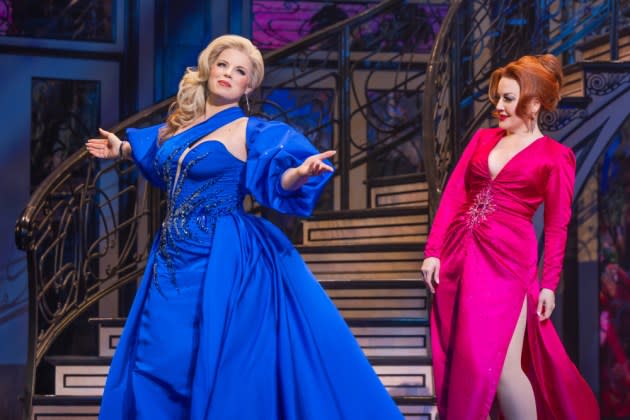‘Death Becomes Her’ Review: Promising Pre-Broadway Musical Makes for a Campy Improvement on the Cult Film

A more-than-respectable entry in the endless parade of movies-to-musicals, this genuinely funny, effervescently performed pre-Broadway take on the 1992 Robert Zemeckis dark comedy “Death Becomes Her” has a better, and more sympathetic, understanding of the female vanity and rivalry at its core — and their underlying camp qualities — than the original film ever did. Going for the camp jugular brings risks, but lead performers Megan Hilty (“Smash,” “9 to 5: The Musical”) and Jennifer Simard (“Once Upon a One More Time,” “Company”) put forth the teamwork, timing, and ribald titillation to make it work.
Originally starring Meryl Streep as a fading movie star, Goldie Hawn as her bookish, lifelong frenemy, Bruce Willis as the plastic surgeon they fight over, and Isabella Rossellini as the purveyor of a magic potion that promises eternal youth, the film, written by Martin Donovan and David Koepp, fell apart soon after a flurry of spectacular special effects depicting bodily damage (a spinning head, a giant shotgun hole) that demonstrated the potential pitfalls, and black humor, of immortality combined with physical catastrophe.
More from Variety
'Death Becomes Her' Musical Starring Megan Hilty and Jennifer Simard Coming To Chicago
'Smash' Cast Reflects on NBC Drama's Legacy: 'It's Like We're Living a Dream'
Book writer Marco Pennette (showrunner on “Ugly Betty”) makes many smart choices in this adaptation, starting with Michelle Williams (still most famous for her time with Destiny’s Child) in the Rossellini role, singing to us that, “I have a secret you would die for.” Dressed in a glam black gown with a stand-up collar worthy of Cruella DeVille, she arrives surrounded by a bevy of scantily clad dancers. She’ll amusingly appear in diva-appropriate get-ups (from designer Paul Tazewell) throughout the show as things go wrong with our leads, who crave beauty and one-upmanship enough to swallow the potion that keeps wrinkles away but doesn’t protect the body from external damage.
From that opening dance number, we switch to Hilty’s Madeline Ashton, where director-choreographer Christopher Gattelli (“Newsies”) and the clever composing team Julia Mattison and Noel Carey (this will be their first Broadway credit, slated for the Lunt-Fontanne in October) make it clear they know exactly who has kept the memory of the movie alive, with the song “For the Gaze.” Although it does cleverly address a star’s desire to be seen, if you think the reference to a gay fan base is simply a double-entendre, you will soon be cured of that by a Liza Minnelli imitation and a row of bared male butts.
The other sharp choices involve where Pennette spends our time in a show that’s paced quite well. He lets the rivalry between Madeline and Simard’s character Helen Sharp develop more with an extended dinner scene, in which we gradually see Helen’s fiancée, Dr. Ernest Menville (Christopher Sieber), fall for Madeline’s flirtations. But he also lets them reconcile more quickly, and more fully, after their big central showdowns, which include an impressively staged tumble down the staircase (the illusion designer is Rob Lake), as well as Tazewell’s take on a broken neck and smoking abdomen hole. (The best, and most representative, line of the night might be when Helen, responding to Madeline’s desire to touch her stomach gap, says with appropriate nonchalance, “Stop fingering my hole.”)
Rather than spending too much time on Ernest’s efforts to escape taking the potion, which the film did, Pennette gets us more quickly and lastingly to the eternal post-death-but-still-going frenemy-ship of the women, which reaches a crescendo with the 11 o’clock number “Alive Forever.” It brings significant echoes of “For Good” from “Wicked,” just as so much else here strives for the Elphaba-Glinda connection. It’s a soaring duet, beautifully sung, but while it does provide a sincere moment, this is where the camp approach throughout keeps the show from achieving poignancy. Fortunately, the final scene moves us back to the purely comic, including a clever non-finale finale called “There’s No Finale.”
This is without question an entertaining show that knows exactly what it is and delivers, and that, appealingly, possesses a joie de vivre that accompanies its deathly black humor. But the genre of the broadly comic adult musical has seen more commercial underperformers (e.g., “Shucked,” “Escape to Margaritaville,” “Honeymoon in Vegas”) than hits (e.g. “Little Shop of Horrors,” “Book of Mormon”). The stellar star-turns should make an initial difference – Hilty and Simard are genuinely phenomenal here – and continued sharpening of the emotional undercurrents could make a more lasting impression as long as the camp appeal doesn’t collapse from too much caring.
Best of Variety
Sign up for Variety’s Newsletter. For the latest news, follow us on Facebook, Twitter, and Instagram.